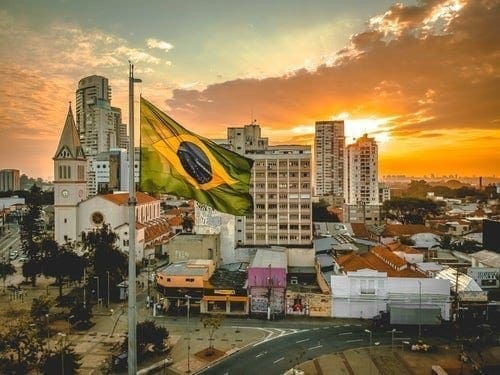Brazilian popular music, known as MPB, Musica Popular Brasileira, has had a profound impact on the world. While bossa nova remains the most widely listened to genre in Brazil, the many variants inspired by Brazilian heritage have influenced French chanson, American pop and world music from Africa and the Caribbean since the 19th century. In exchange, the country has taken what it rightfully deserved. Brazil has an extraordinary capacity to absorb, an inclination towards cultural “cannibalism”. The cannibals and their leader, the poet Oswaldo de Andrade, published a manifesto in 1928 with the slogan “Tupi or not Tupi”, or how to satisfy national appetites by borrowing whenever necessary, from colonisers in particular.
The election of Jair Bolsonaro at the end of 2018 produced a profound uneasiness among artistic and cultural communities. A homophobic president who swears by the Bible and has links to the radical fringes of neo-Pentecostal churches, Bolsonaro named retired general Antonio Hamilton Mourão as his vice president. During the election campaign, Mourão called on Brazilians to overcome their vira-lata complex (“mongrel complex”). From the Portuguese, he added, Brazil had inherited a “tendency to demand privileges… from indigenous culture, a certain indolence” and from Africans, a “thuggish side”. Born in Amazonia, General Mourão went on to deny accusations of racism, laying claim to his native origins.
In the meantime, the joyful cultural melting pot on which Brazilian society is founded faltered in this review of history, in which music has top billing. From Milton Nascimento to Hermeto Pascoal, from Elza Soares to Gilberto Gil and Marisa Monte, Brazil boasts all the colours of the rainbow. In the early 1960s, Vinicius de Morais and Tom Jobim invented bossa nova, while the new capital Brasilia was being built. Then, fighting against the military dictatorship established in 1964 (until 1985) and borrowing from the Beatles and Jimi Hendrix as much as samba, the Bahianais (Os Mutantes, Gil, Caetano, Gal Costa…) invented tropicália, a devilishly psychedelic genre, haunted by great champions of destructuring such as Tom Zé.
Up against the rise in power of the “Trump of the Tropics”, singers and musicians have been retaliating since 2018, each in their own way: Chico Buarque – a Workers’ Party supporter since its inception – whose song “Apesar de vôce” (1978) was used during anti-Bolsonaro protests; Caetano Veloso, who has written some searing columns in both Brazilian newspapers and the New York Times; Daniela Mercury, the queen of axé music who rallies to the publicly anti-fascist stance taken by young pop star Anitta; and Emicida, the rapper from São Paulo, who adds her voice to those of Brazilian hip-hop icons such as Racioniais MC in denouncing violence, racism and brutal inequalities.
All this proved to be in vain as Jair Bolsonaro was eventually elected with 55.1% of the vote. Social networks, WhatsApp in particular, have come under attack for spreading fake news: for example, Fernando Haddad, Bolsonaro’s opponent, was falsely accused of wanting to distribute a “gay kit” to schools.
As soon as it came to power in January 2019, the Brazilian government began targeting indigenous people from whom the president is keen to confiscate lands for the benefit of agribusiness and mining companies. A founding element of Brazilian identity, candomblé – the Afro-Brazilian spiritual tradition steeped in religious syncretism born out of slavery – has become a recurring target for evangelicals. Carnival is amoral and the question of gender, a “heresy”. The Minister of Women, Family and Human Rights, Damares Alves, who swears to have seen Jesus appear in a guava tree, stated publicly three days after taking office: “Boys must be dressed in blue and girls in pink”. Immediately after which, Caetano Veloso wore a pink T-shirt with the words “Protect your friends”.
In February, Caetano recorded Proibido o Carnaval with Daniela Mercury, a torrid and exuberant axé song. She is dressed in blue; he’s wearing a pink tie.
Daniela Mercury, a model of tropical femininity and a divorced mother, married journalist Malu Verçosa as soon as gay marriage was legalised in Brazil in 2013. She wrote the lyrics for the song, teeming with indigenous names, references to candomblé and allusions to the colours pink and blue [“Quilombola, Tupinambá / O corpo é meu, / ninguém toca / Vatapá, caruru / Iemanjá lá no sul / Vai de rosa or vai de azul?“] and, right in the middle, the statement: “My body is mine, nobody touches it”. The song delighted the Carnival in Salvador da Bahia, part of the north-eastern territories that largely voted for the labour party candidate Fernando Haddad and supports Lula, who is serving a twelve-year prison sentence on corruption charges. The fellow conspirators dedicated the song to Jean Wyllys, a gay left-wing MP (for PSOL - The Socialism and Liberty Party), who was forced into exile after repeated death threats in January 2019.
The new Brazilian government began by abolishing the Ministry of Culture, while merging the environment and agriculture ministries to focus on agribusiness. It then turned its attentions to the mechanisms for financing culture, in particular the SESC, Brazil’s main cultural body funded by a tax levied on Brazilian tertiary sector firms and considered too left-wing. Stubborn and powerful, the SESC-São Paulo refused to make even the slightest changes to its programme, hosting, for example, rapper B-Negao, co-founder of the Planet Hemp collective with Marcelo 2D.
B-Negao was behind a manifesto against Bolsonaro published in November 2018 on the website RapPelaDemocratia, also signed by Emicida and Criolo: “Among various atrocities, Jair Bolsonaro believes that the police have the right to kill without being accountable. He declares without embarrassment or shame that black women are not worthy of getting married. He refers to quilombolas (the descendants of escaped slaves who founded communities called quilombos in the 19th century) as if they were cattle. He champions an end to the hard-earned rights of domestic employees. […] The absolute majority of the victims here are black people who live in the suburbs. Do you think that makes sense?”
It is clear that corruption and growing violence have shifted the popular vote towards far-right authoritarianism. And yet, nothing seems to have undermined the primitive faith of Brazilians in their destiny. Brazil dances, criticises, lives and differences emerge. This is demonstrated by the new muse of vibrant freedom in Brazil, the rapper from Curitiba Karol Conka, who has just released her third album, Ambulante. In her voguing inspired video, “Vogue do Gueto”, the black feminist activist portrays gay couples, dominant women and transsexuals alongside feminist collectives such as We Are Magnolias, Batekoo, As Irenes, Estaremos Là and Mooc.
In this cultural environment that has emerged from the favelas and working-class areas, the old orders of macho rap and Rio’s baile funk are shattered, as shown by the extravagant performances of transvestite Linn da Quebrada.
Rio’s Carnival is traditionally a riot of cross-dressing as well as social and political protest. In 2018, people were delighted by caricatures of acting president Michel Temer and Marcello Crivella, evangelical Mayor of Rio, whose decision to cut subsidies for the samba schools was judged amoral. The winner of the first division schools parade, Beija-Flor, used Frankenstein’s monster as a metaphor for Brazil, with a greedy belly gorging on corruption and inequalities.
A year later, the street parades called blocos stood up to the far right and told “Bolso” to f… off in their marchinhas – satirical marches sung in unison. Inevitably, Damares Alves, the anti-gender minister for whom all teachers are “reds”, also gets it in the neck. But the irony of these short plays performed with guitars and surdo drums has also focused on the liberalisation of bearing arms in a country already racked by violence. In February 2019, the march “Reaça”, pobre de direita, composed and performed by the Familia Ramos – a genuine Curitiba family with a love for music and parody – went viral on social media. While the Ramos family were ironically singing that “they were going to buy a gun to shoot communists,” Belo Horizonte’s Orquestra Royal, a young and multi-ethnic ballroom orchestra, launched a fiery frevo do Nordeste entitled “Overdose de goiaba” [Overdose of guava], mocking Ms. Alves’ visions.
However, as usual it was up to the great samba schools to tell the story with a capital S. Like futebol teams, each school has its own colours and supporters and Mangueira school, in green and pink, chose to go against the dogma that traces the foundation of the Brazilian nation back to the arrival of the Portuguese in 1500. In reality, the “discoverers” were crushing invaders who slaughtered the natives. The rules of samba school parades in Rio are very strict. Scores awarded by the jurors are very tight: the flag bearer, Bahian wing, percussionists’ cohesion, and of course, the samba de enredo – the song repeated ad libitum during the mandatory 45-minutes parade that escorts the floats and dancers – are all rigorously assessed. Mangueira won in 2019 and was awarded exceptionally high marks in every category.
“Salve os caboclos de julho / Quem foi de aço nos anos de chumbo / Brasil, chegou a vez / De ouvir as Marias, Mahins, Marielles, malês”: Mangueira’s samba de enredo makes reference to caboclos, Brazilians with mixed black and indigenous heritage; malés, slaves who rebelled in Salvador de Bahia in 1835; and marielles, referring to the assassination on 14 March 2018 of Marielle Franco – a black LGBT Rio city councillor and mother to a little girl – who fought against police violence. A year later, the police arrested two former members of the military police suspected of having shot the young woman; numerous factors point to their close ties to the Bolsonaro family.
Brazil is a vast country: from the megalopolis of São Paulo and its underground electronic music scene to the desert interior of the north-east, or from Rio de Janeiro, the City of Wonders, to the black Bahia. From the temple to futebol, the Maracana stadium, to celebrations for the festival of Saint John, Brazil is deeply religious and strongly connected to nature. Tom Jobim – a thin, black-haired dandy who checked out pretty girls from the Veloso bar terrace while inhaling the greenness of the Tijuca forest overlooking Rio – described himself as: “Antonio Carlos Joubin, son of a European and an Amazonian monkey”.
By all accounts, Brazil is united by a very special spirit that is its gift to the world: alegria (joy and humour), saudade (melancholy in a jubilant soul), rhythm, body freedom and romance. In the great Portuguese poetic tradition, love in Brazil a temple, explored by special women and men who do not fear their femininity. “Let time decide / If it must happen / Live / Free,” sings Maria Bethania. “I’m like the mandacaru [a cactus from the north-east that holds water] / Your contempt does not make me sad / I’m grateful for your mere existence,” continues Alceu Valença. “We may run out of money, real, cruzado, cruzeiro [Brazil’s currency has seen many changes] / Love is worth more than anything,” concludes Rita Lee. The latter, a 70-year-old rebellious rocker and former Os Mutantes, recently had people in stitches when she revealed on Twitter that she had once had a relationship with “Bolsinho” (little Bolsonaro) that was cut short as he was supposedly “not all that curious about doing it because he was more interested in a male classmate”.


